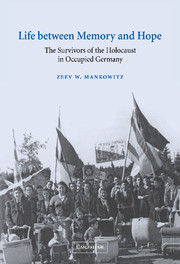Book contents
- Frontmatter
- Contents
- Plates
- Acknowledgments
- Abbreviations and note on spelling and dates
- Introduction
- 1 The occupation of Germany and the survivors: an overview
- 2 The formation of She'erith Hapleitah: November 1944 – July 1945
- 3 She'erith Hapleitah enters the international arena: July–October 1945
- 4 Hopes of Zion: September 1945 – January 1946
- 5 In search of a new politics: unity versus division
- 6 The Central Committee of the Liberated Jews in Bavaria
- 7 The politics of education
- 8 Two voices from Landsberg: Rudolf Valsonok and Samuel Gringauz
- 9 Destruction and remembrance
- 10 The survivors confront Germany
- 11 She'erith Hapleitah towards 1947
- Concluding remarks
- Bibliography
- Index
- Studies in the Social and Cultural History of Modern Warfare
5 - In search of a new politics: unity versus division
Published online by Cambridge University Press: 06 August 2009
- Frontmatter
- Contents
- Plates
- Acknowledgments
- Abbreviations and note on spelling and dates
- Introduction
- 1 The occupation of Germany and the survivors: an overview
- 2 The formation of She'erith Hapleitah: November 1944 – July 1945
- 3 She'erith Hapleitah enters the international arena: July–October 1945
- 4 Hopes of Zion: September 1945 – January 1946
- 5 In search of a new politics: unity versus division
- 6 The Central Committee of the Liberated Jews in Bavaria
- 7 The politics of education
- 8 Two voices from Landsberg: Rudolf Valsonok and Samuel Gringauz
- 9 Destruction and remembrance
- 10 The survivors confront Germany
- 11 She'erith Hapleitah towards 1947
- Concluding remarks
- Bibliography
- Index
- Studies in the Social and Cultural History of Modern Warfare
Summary
With liberation there were repeated efforts, formal and informal, to establish a united Zionist movement in Bavaria. The quest for a new order that would set aside old divisions had already been part of the ethos of the Irgun Brith Zion in the Kovno Ghetto; it reappeared in both Buchenwald and Kaufering as preparations for liberation got underway and moved on to center stage as an ideal evoking deep resonance in the early organization of She'erith Hapleitah. In the latter half of 1945 it looked like these efforts, with all their ups and downs, might be crowned with success but, by the beginning of 1946, the hopes of those favoring unity began to recede. From October to November 1945 various groupings seeking to preserve their independence began to break away from the general framework and once this happened others were tempted to follow suit. In the first half of 1946, therefore, the unity camp while still believing in value and necessity of a broader framework slowly became, by default, one movement among others.
The quest for unity that animated survivors throughout Europe in the immediate aftermath of the war appeared in different guises in Poland, Hungary, Czechoslovakia and, in its most sustained form, in Germany. The loneliness and pervasive sense of loss, the experience of being abandoned by all, the remembrance of Jewish disarray in the face of Nazi aggression and the fear of continued vulnerability created a community of fate that sought to bind itself in a protective cover of unity.
Information
- Type
- Chapter
- Information
- Life between Memory and HopeThe Survivors of the Holocaust in Occupied Germany, pp. 88 - 100Publisher: Cambridge University PressPrint publication year: 2002
